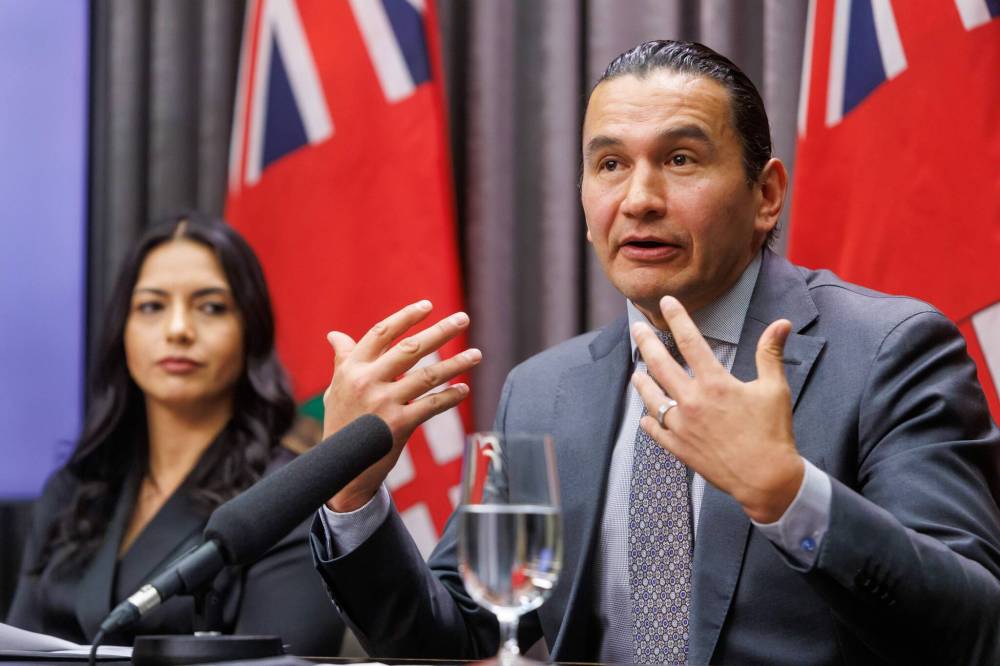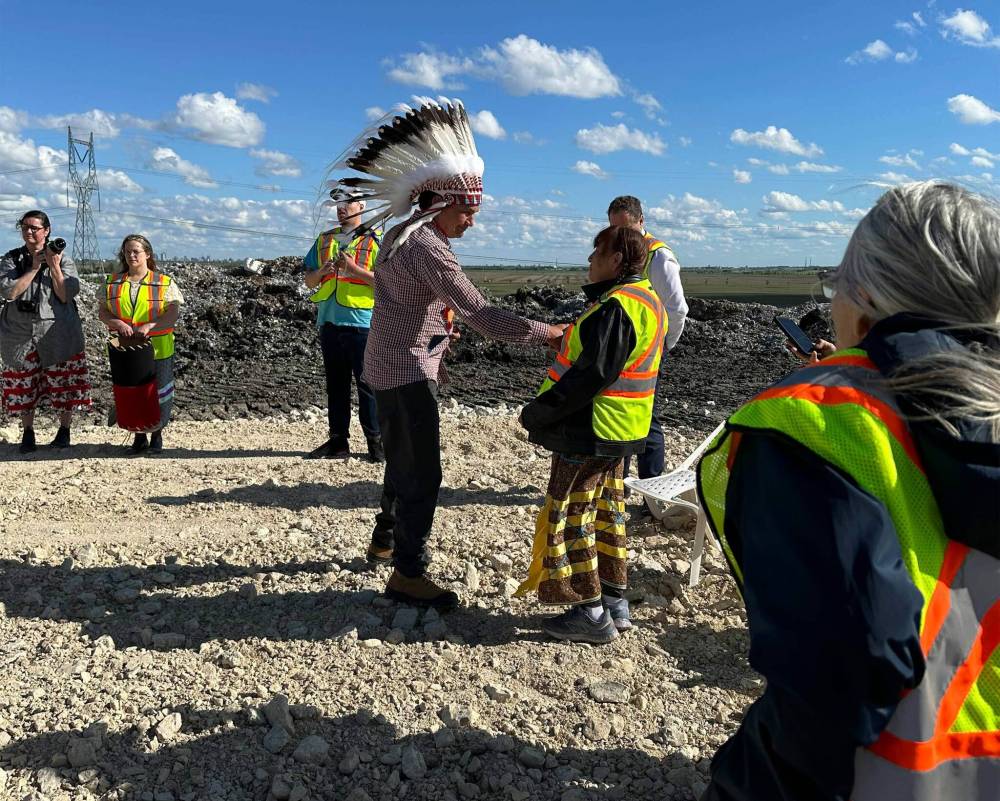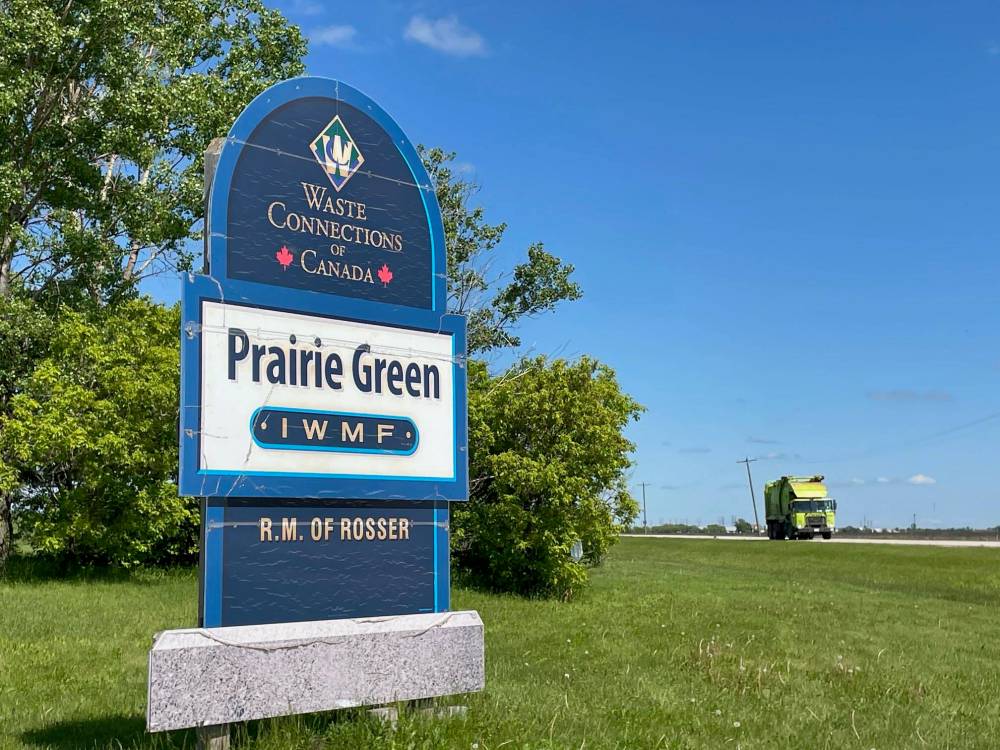Landfill search for Indigenous women cost $18M, one-tenth of original estimate: Kinew
Read this article for free:
or
Already have an account? Log in here »
To continue reading, please subscribe:
Monthly Digital Subscription
$0 for the first 4 weeks*
- Enjoy unlimited reading on winnipegfreepress.com
- Read the E-Edition, our digital replica newspaper
- Access News Break, our award-winning app
- Play interactive puzzles
*No charge for 4 weeks then price increases to the regular rate of $19.95 plus GST every four weeks. Offer available to new and qualified returning subscribers only. Cancel any time.
Monthly Digital Subscription
$4.99/week*
- Enjoy unlimited reading on winnipegfreepress.com
- Read the E-Edition, our digital replica newspaper
- Access News Break, our award-winning app
- Play interactive puzzles
*Billed as $19.95 plus GST every four weeks. Cancel any time.
To continue reading, please subscribe:
Add Free Press access to your Brandon Sun subscription for only an additional
$1 for the first 4 weeks*
*Your next subscription payment will increase by $1.00 and you will be charged $16.99 plus GST for four weeks. After four weeks, your payment will increase to $23.99 plus GST every four weeks.
Read unlimited articles for free today:
or
Already have an account? Log in here »
The successfully completed search of a Winnipeg-area landfill for two victims of a convicted serial killer cost $18 million — less than one-tenth of the original worst-case estimate, Premier Wab Kinew revealed Wednesday.
A 2023 feasibility study estimated the effort to comb privately owned Prairie Green Landfill north of the city for the remains of the Indigenous women could take up to three years and cost up to $184 million.
“Most importantly, the landfill search was successful at returning Marcedes Myran and Morgan Harris,” Kinew said outside his office at the legislature.

MIKE DEAL / FREE PRESS FILES
Premier Wab Kinew, right, announced Wednesday the completed search of Prairie Green Landfill for two victims of a convicted serial killer cost $18 million.
The search that began Dec. 2 turned up partial remains of both Indigenous women within a few months. Myran, 26, and Harris, 39, were murdered, along with two other Indigenous women between March and May 2022 by serial killer Jeremy Skibicki.
His trial heard he targeted the women at homeless shelters and disposed of their bodies in garbage bins.
Two years ago, a federally funded, Indigenous-led feasibility study arrived at the $184-million figure and noted the possible presence of asbestos in the landfill.
Manitoba’s Progressive Conservatives seized on the possible cost and risks, making that a key plank in their 2023 election campaign, in which the party, led by then-premier Heather Stefanson, vowed to “stand firm” against a search.
During a televised debate before the election, Stefanson asked then-NDP opposition leader Kinew, “Why are you willing to put $184 million and Manitoba workers at risk for a search without a guarantee?”
Jon Lovlin, a spokesman for the PC caucus, said Stefanson, her interim replacement Wayne Ewasko and now-Leader Obby Khan have all apologized for the campaign “and the harm it caused to the victims’ families.”
“The government does what it says. I told the people of Manitoba I was going to search the landfill, that we would do so in a fiscally responsible way and we’ve delivered on that.”–Premier Wab Kinew
Kinew said he made good on his campaign promise.
“The government does what it says. I told the people of Manitoba I was going to search the landfill, that we would do so in a fiscally responsible way and we’ve delivered on that,” he said Wednesday. “That says something good about the province.”
The federal and provincial governments each committed $20 million to the costs.
Kinew said the effort included “the Cadillac-version of health and safety for the workers” with trauma-informed mental-health supports. It involved approximately 45 searchers and required electrical infrastructure and construction of an access road at Prairie Green.
He said that there is still more work to be done decommissioning the search site, potentially adding another $2 million to the final bill.
The remaining work includes cleaning up the site and moving the metal search structure to the city-owned Brady Road landfill, where investigators believe the remains of Skibicki victim Ashlee Shingoose, 30, are located.

Supplied
Donna Bartlett, grandmother of slaying victim Marcedes Myran, at Prairie Green Landfill with premier Wab Kinew during a ceremony in June, 2024.
“We’re still working on the Brady plan; I haven’t really announced that in any detail yet,” said Kinew, who last week indicated a preliminary search of the facility had begun.
Ground-penetrating radar tests were being conducted to narrow down an area, leading to a proper search that could happen later this year, Kinew said last week.
The province is also making plans to search the Brady facility for the remains of Tanya Nepinak, who investigators believe was slain by a different serial killer. Police searched a small area of the landfill in an effort to find her in 2012 but concluded the effort after a week. Kinew said there are ongoing conversations with her family about resuming the search.
The premier wasn’t able to say how much the province is budgeting for the Brady landfill search, or if it can use any of the remaining $20 million pledged by the federal government toward it.
At an unrelated event Wednesday, federal Indigenous Services Minister Mandy Gull-Masty said she didn’t know about the search but commended Kinew for committing to it.
“We haven’t had a specific request that I’m aware of,” said Gull-Masty, a Cree MP from Quebec.
“You know, that is probably — as an Indigenous woman — one of the most challenging things to see; that you live in a country where the province has to seek for remains of Indigenous women in a landfill.”

Ruth Bonneville / Free Press Files
A 2023 feasibility study estimated the effort to search Prairie Green Landfill for the remains of the Indigenous women could take up to three years and cost up to $184 million.
— With files from Nicole Buffie
carol.sanders@freepress.mb.ca

Carol Sanders
Legislature reporter
Carol Sanders is a reporter at the Free Press legislature bureau. The former general assignment reporter and copy editor joined the paper in 1997. Read more about Carol.
Every piece of reporting Carol produces is reviewed by an editing team before it is posted online or published in print — part of the Free Press‘s tradition, since 1872, of producing reliable independent journalism. Read more about Free Press’s history and mandate, and learn how our newsroom operates.
Our newsroom depends on a growing audience of readers to power our journalism. If you are not a paid reader, please consider becoming a subscriber.
Our newsroom depends on its audience of readers to power our journalism. Thank you for your support.





